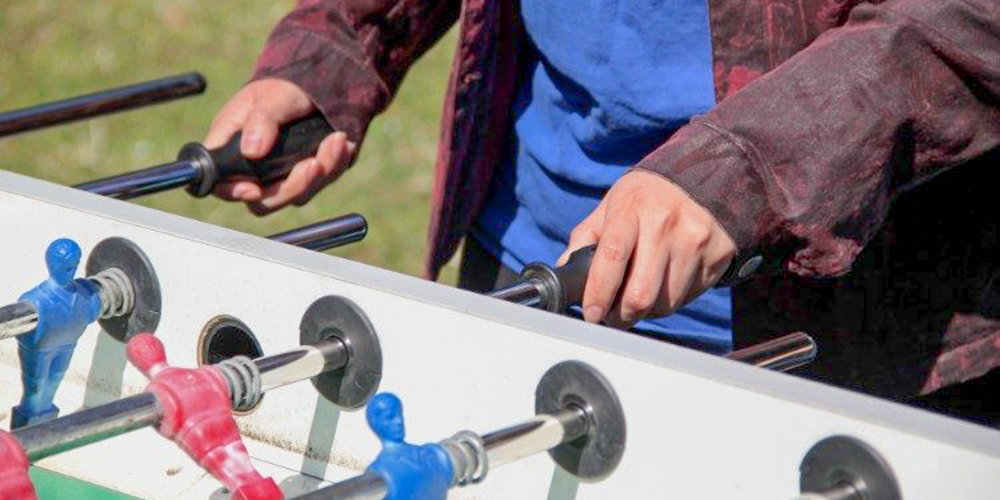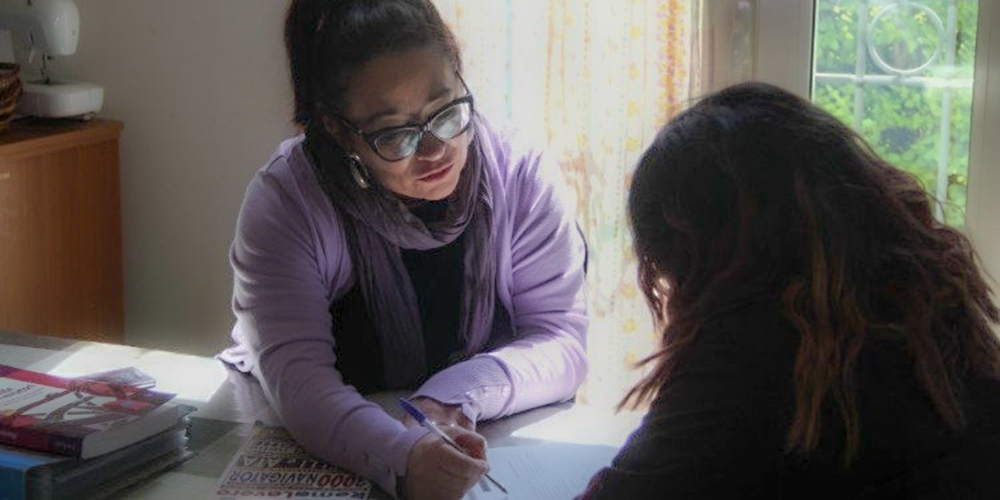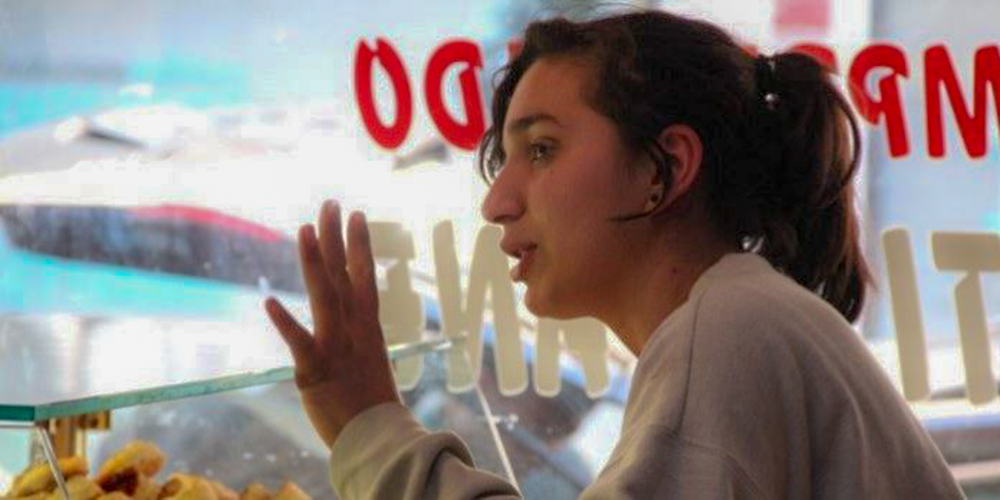As soon as she starts talking, Adriana gets emotional. Her voice breaks, her eyes shine, her hands clutch at each other, as if to give herself courage. Despite my invitation to stop and catch her breath, she reassures me that her tears are “tears of joy".
Adriana is 23 years old, she has a house, a family, friends, and she works at a bakery in Rome. She loves her work but, above all, she loves to chat with the people of the neighborhood. For them Adriana is no longer the "gypsy" to be suspicious of, but a girl like many others who shares the big and small dreams of her peers.
Adriana’s life was not always like this. She has shed many tears, and none of them were “tears of joy”. She is a Roma, born in Italy, of a Croatian father and a Serbian mother. A tattoo on her skin is the indelible signs of her origins, and her suffering.
When she arrived at the Don Bosco Children's Centre in 2013, to start a project of work placement, Adriana had nothing but the clothes on her back and the shoes on her feet. Her home was a camper van, bought with the sale of land abroad. It was parked in a Roma camp on the eastern outskirts of the city, when the police arrived to seize it.
“I never liked Roma life”, she tells me. “It's a hard life, even harder for a teenager. Just one thrashing after another”.
 Foosball tables are a commmon sight in Salesian places all around the world, and it is no different at the Don Bosco Children's Welcoming Centre in Rome.
Foosball tables are a commmon sight in Salesian places all around the world, and it is no different at the Don Bosco Children's Welcoming Centre in Rome.
The story of Adriana and her family is one of abandonment and denial, of travelling from one place to another, hoping to find a welcome somewhere. The first to leave home was her father. Then her grandparents and one of her sisters. Her mother struggled to take care of her six children the best way she could, "like all Roma do", says Adriana. That meant by committing petty thefts and begging.
“We washed windows at traffic lights and we slept on the street. Sometimes, as absurd as it sounds, if we were lucky, we slept at the police station, or in the emergency room of a hospital. At least we had a roof over our heads. I lived like this from when I was 8 to when I was 15 years old. This is how people see you when you are a Roma: like a criminal, someone who hurts others, even if you are different after all".
The turning point came one summer day with the conversion of Adriana’s mother. Desperate and sick, she decided to enter an Evangelical Church. The encounter with Christ, the welcome of the community, the strength of prayer, all awoke in her the need to make a radical choice: to abandon the Roma life forever and to live integrated with the world - the “gagé” world (the term with which the Roma people indicate those who are not of Roma ethnicity).
“My Mother gave us the freedom to choose what life we wanted”, says Adriana. “And we chose. But in the eyes of my people we were seen badly, we were treated badly, and discriminated against by them too. Many people said: you were a criminal, now you are talking to me about God, are you kidding me? What you're telling me is weird, it isn’t true". But for Adriana, that new life, that leap into the unknown, was the brightest and most "normal" thing that could have happened to her. She describes the help she received from the members of this community, and how extraordinary it was to see the absence of prejudice in their eyes.
"It may seem silly to you, but they treated me, and they still treat me, with affection, while knowing that I was a Roma. One day someone said to me: we are all equal in the eyes of God, because we are all his children, and as his children, we are brothers and sisters too. “God”, this is the name Adriana repeats most often, and every time it seems like she is praying a prayer of thanksgiving. God the Father who never abandons her. The Friend to whom to confide all your fears, but also your successes, your hopes.
 Adriana is still becoming accustomed to positive feelings such as hope, welcome and love.
Adriana is still becoming accustomed to positive feelings such as hope, welcome and love.
Her mother's conversion, and change for the better, happened during one of the periods when Adriana’s father was away. In prison, in fact. But as soon as he was released, he made the family move, first to Naples, and then to Spain, where they lived for eight months. It was there that the children were able to attend school, for the first time in their lives. The Spanish experience ended soon, however, because of new problems and quarrels between her parents. They returned to Italy, then went to France.
With insurance money they received after Adriana was involved in an accident, the family bought a plot of land to build a house. But their problems were far from over. The children began attending classes again. Their classmates would laugh at them, always because of that indelible tattoo with the words "Roma" imbedded onto their skin. They didn't know the language, they had no friends, even the teachers treated them differently. Adriana’s eldest sister refused to accept this change of lifestyle, and ran away to marry a young Roma man in secret.
Then, when they decided to go to the local authorities to legalize their position, the same authorities decided to separate the family. With no legal documents, they ordered her mother to return to Serbia, or the whole family would be deported with immediate effect. Adriana's parents decided to go back to Italy but, having no money, they had to sell the land.
As soon as they arrived in Italy, Adriana’s father again abandoned the family. They ended up sleeping in a car until her mother managed to buy the notorious camper that was subsequently seized by the police.
The family spent a week as “guests” in the emergency room of a Rome hospital. Then her maternal grandmother invited them to move into the Roma camp with her. The invitation came with one non-negotiable condition: they were to give up their freedom and accept the rules and lifestyle of the camp. These rules included arranging marriages for the girls and sending out the other children to steal and pick pockets. Adriana's mother refused.
It was then, unexpectedly, that the Don Bosco Centre transformed itself into “the hand of God", an invisible hand that allowed Adriana to make that definitive leap. Operators at the Centre found temporary housing for the family. They even took up a collection to get back the camper. Benefactors took charge of supporting them financially, at least for their most basic needs.
Adriana was just 17 years old at the time. They found her a job placement through an internship, made available by the Don Bosco Children's Welcoming Centre. Support and orientation interviews began. Adriana wanted to become a cook. She loved putting her hands in flour; she loved the idea of preparing food for someone else
 The Don Bosco Children's Welcoming Centre offers one-on-one work orientation classes, to find the right job for the right person
The Don Bosco Children's Welcoming Centre offers one-on-one work orientation classes, to find the right job for the right person
In June 2014, she obtained her middle school diploma and got her first real job at a café in Rome. There she learned how to run a small kitchen. She also learned how to cope with a world made of rules, regulations and responsibilities. Sometimes she got upset because she felt she was too slow and clumsy. She was constantly afraid of making mistakes and breaking things. But every morning, when her alarm clock sounded, she was happy to get up and go to work. "It was like a dream. At the end of the month, I said 'wow I have a salary'. It was both beautiful and absurd".
After the internship at the café, she rolled up her sleeves and supported by faith, she moved on, determined to change her destiny forever. "There were also days when I wanted to give up everything. I cried”, she continues. She could not let the Roma people see her cry and she suffered continuous harassment. For Italians, she was still a Roma, and could not even enter some places. She still had her younger brothers to think about, her mother who was sick, and still without documents. Her father came and went. “But I wasn't alone. God was with me, His hand in mine".
In May 2015, the family was finally offered an apartment with a regular lease, in a small town near Rome. Finally, Adriana had a real bed, a kitchen, a bathroom. It was as though she had been given the Moon, she says. This allowed her to apply for a residence permit and have access to essential services. "I could go to the doctor and get treatment, something impossible for the Roma".
Adriana had different working experiences, as a domestic helper and babysitter. Then, a priest-friend of the family helped her find her current employment at the bakery. She is still there today. "I really love this job. I love chatting, and people come here to buy bread and pastries and they tell me their stories. Sometimes I tell them my own".
I ask Adriana what she tells them. (In my own mind, I am thinking about living in a camper without running water, of endlessly moving from place to place). But she answered me without hesitation: "I tell them that God saved me, that I feel loved by Him, and that this is the most beautiful thing that exists in the world. I made the leap and I am happy”.

This story orignially appeared in the Vatican News

